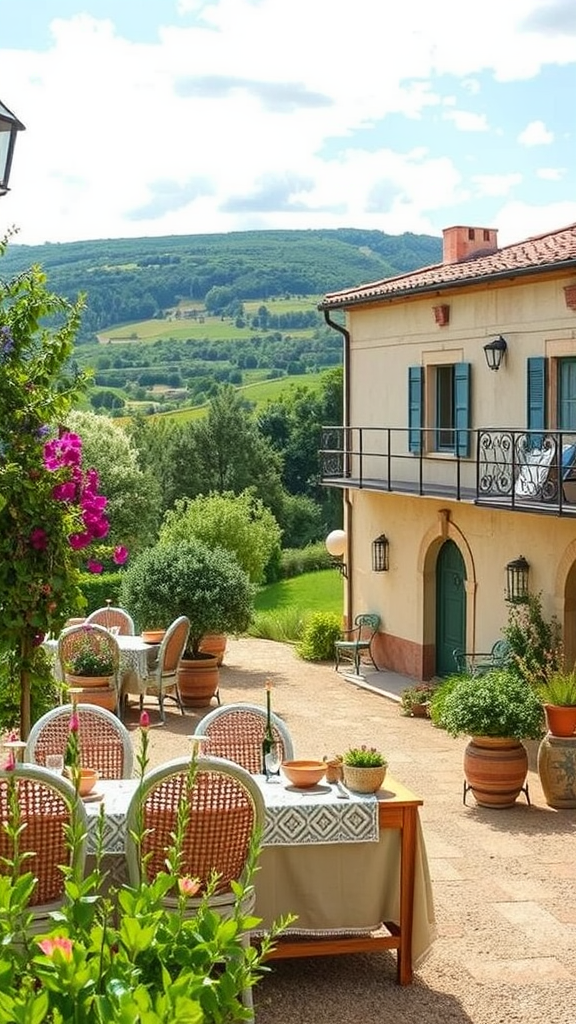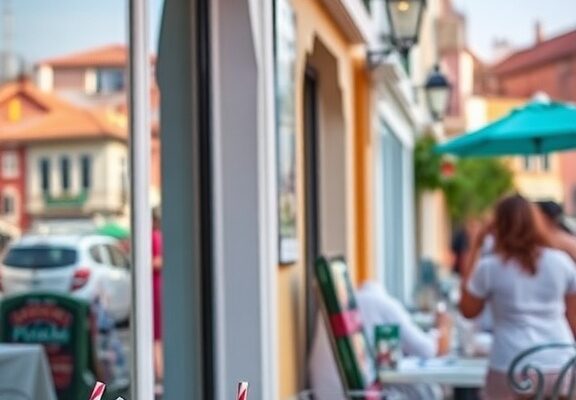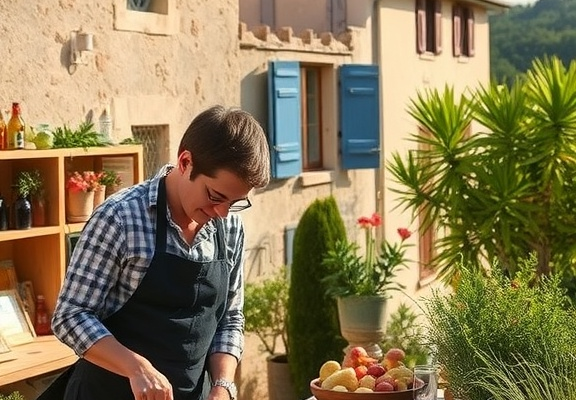Exploring Culinary Schools: Where to Take a Cooking Class in Provence
Provence is known for its stunning landscapes, rich history, and vibrant culture, but one of its highlights is undoubtedly its amazing culinary scene. Taking a cooking class in this charming region can be a transformative experience, allowing you to delve into the local cuisine while embracing the region’s culinary traditions. Here are some excellent places you might consider when looking to take a cooking class in Provence.
Thank you for reading this post, don't forget to subscribe!La Mirande, Avignon
Located in the heart of Avignon, La Mirande is a luxurious hotel that offers exceptional cooking classes. Here, you can learn from expert chefs who are passionate about Provençal cuisine. Classes cover a range of topics, from basic techniques to advanced skills, and they often include trips to local markets to select fresh ingredients.
Highlights:
- Hands-on experience in a historical kitchen.
- Focus on seasonal and local ingredients.
- Wine pairing lessons included to complement your dishes.
Ooh La La Cooking Classes, Various Locations
Ooh La La offers a variety of cooking classes throughout Provence. Whether you are looking to master the art of making pastries or cook up classic French dishes, their classes feature personal attention in a warm, inviting atmosphere. Classes are usually small, ensuring you receive guidance tailored to your skill level.
Highlights:
- Wide range of classes including vegetarian options.
- Individualized attention with small class sizes.
- Classes conducted in English for international visitors.
Atelier des Chefs, Marseille
In the bustling city of Marseille, Atelier des Chefs offers an interactive approach to cooking. This culinary school provides a fun and energetic atmosphere where you can sign up for classes that fit your schedule. Their workshops range in duration, allowing for flexibility whether you have an hour or a full day.
Highlights:
- Classes available in different lengths, including one-off sessions.
- Variety of topics, including appetizers, main dishes, and desserts.
- Opportunity to learn from experienced chefs in a vibrant setting.
Provence Culinary Institute, Aix-en-Provence
The Provence Culinary Institute is dedicated to providing an authentic cooking experience. Their classes often focus on local ingredients, and you’ll get a chance to visit nearby markets. The instructors emphasize traditional cooking techniques that have been passed down through generations.
Highlights:
- Classes can be customized based on your interest.
- In-depth lessons in traditional Provençal dishes.
- Market tours included to enrich your culinary knowledge.
Cooking in Provence, Various Locations
This unique organization offers cooking classes in various charming locations across Provence. Each class is run in a picturesque setting, which adds to the overall experience. Whether it’s in a rustic farmhouse or an elegant villa, the ambiance enhances your learning experience. Classes here focus on the philosophy of “cooking with love” while using local produce.
Highlights:
- Classes taught by local chefs who share personal stories.
- Focus on farm-to-table concepts.
- Beautiful settings that inspire creativity while cooking.
No matter where you choose to take a cooking class in Provence, you will find that each location offers a unique take on the culinary arts. With hands-on learning experiences and delicious results, these classes are sure to enrich your cooking skills while immersing you in the vibrant culture of this beautiful region.
So, pack your bags, prepare your taste buds, and get ready to explore the culinary delights of Provence. A cooking class is not just an educational journey; it’s an opportunity to form lasting memories, create delightful dishes, and perhaps even discover a new passion.
The Cultural Significance of Provencal Cuisine and its Local Ingredients
Provencal cuisine is a vibrant tapestry woven from a rich history and an array of local ingredients, making it a true reflection of the region’s culture, climate, and terroir. The unique culinary practices found in Provence showcase a harmonious mix of Mediterranean influences, seasonal products, and time-honored traditions. As you explore the flavors of this sun-kissed region, it becomes clear that every ingredient tells a story steeped in historical significance and local pride.
One of the most distinctive features of Provencal cuisine is its emphasis on fresh, local ingredients. The bounty of the region includes an assortment of fruits and vegetables that shine during the long growing season. You will find the following ingredients prevalent in many Provencal dishes:
- Olives: A staple, particularly olive oil, which is central to cooking and dressings.
- Garlic: Known as “l’ail,” garlic adds depth and flavor to numerous dishes.
- Herbs de Provence: A fragrant mix of dried herbs that includes rosemary, thyme, and basil.
- Tomatoes: Grown under the warm sun, they are essential in sauces and stews.
- Eggplant: Often featured in ratatouille, this vegetable showcases the region’s love for vivid flavors.
- Goat cheese: A popular dairy product, enjoyed fresh or aged, often paired with different accompaniments.
The relationship between the local climate and agriculture plays a significant role in shaping the cuisine of Provence. The region benefits from a Mediterranean climate, which allows for a diverse range of crops to thrive. The hot, dry summers lead to an abundance of sun-ripened fruits and vegetables, while mild winters ensure a variety of herbs are available throughout the year.
In addition to the climate, artisanal techniques passed down through generations have preserved the culinary traditions of Provence. Farmers in the region often practice sustainable agriculture, respecting the land and prioritizing quality over quantity. This dedication to quality ingredients aligns perfectly with the philosophy of Provencal cooking, which is often characterized by simple preparation methods that highlight the natural flavors of each component.
Provencal cuisine is also greatly influenced by its historical connections with neighboring cultures. Throughout history, the region has been touched by Greek, Roman, and Arabic civilizations, each leaving its mark on culinary practices. For instance, the use of spices and flavors hails from the trade routes established during ancient times, allowing new ingredients to become part of the Provencal culinary landscape.
This fusion of flavors and techniques is most evident in signature dishes such as ratatouille and bouillabaisse. Ratatouille, a vegetable medley that commonly features zucchini, bell peppers, and tomatoes, represents the essence of Provencal summer. Bouillabaisse, a traditional fish stew, showcases the region’s coastal bounty, bringing together various fish alongside aromatic herbs and spices.
The cultural significance of Provencal cuisine extends beyond just food; it forms the backbone of community and familial gatherings. Shared meals often celebrate local festivals or family milestones, reinforcing bonds and fostering connections within the community. Food markets bustling with vendors and shoppers create an atmosphere that invites social interaction and appreciation for local produce.
Moreover, the art of cooking in Provence is often taught from generation to generation, emphasizing the value of family recipes and traditional cooking methods. Many families hold dear their ancestral culinary secrets, and this reverence for heritage keeps the spirit of Provencal cuisine alive and thriving.
Modern chefs in Provence are increasingly exploring ways to reinterpret these cherished recipes while remaining true to local traditions. By utilizing contemporary techniques and embracing global influences, they create innovative dishes that maintain the essence of these time-honored flavors. As dining trends evolve, the commitment to sustainability and local sourcing remains a priority, ensuring that the integrity of Provencal cuisine is preserved for future generations.
In essence, the cultural significance of Provencal cuisine is tied intricately to its local ingredients, regional history, and communal values. Whether it’s a simple dish made from market-fresh ingredients or a festive gathering that celebrates the joys of food, the flavors of Provence continue to inspire and captivate both locals and visitors. This vibrant cuisine invites you to indulge in its offerings, fostering a connection to the land and its people that is as rich as the dishes themselves.
Conclusion
Taking a cooking class in Provence opens the door to a world of flavors, traditions, and culinary art that defines this stunning region of France. Beyond simply learning recipes, these classes immerse you in the rich cultural significance of Provencal cuisine. You’ll discover how local ingredients—like fresh herbs, sun-ripened tomatoes, and exquisitely prepared seafood—play a vital role in the region’s culinary heritage.
By exploring culinary schools such as École de Cuisine, Le Mas des Herbes Blanches, and the renowned La Mirande, you can find a class that matches your interests and skill level. Each offers unique experiences—from hands-on cooking to intimate dining settings—allowing you to connect with both the food and the vibrant local culture.
These classes are more than just a fun activity; they provide invaluable insights into the techniques that make Provencal cooking so special. You’ll learn the art of balancing flavors, the importance of seasonal ingredients, and maybe even the secrets of traditional family recipes passed down through generations.
Whether you’re a beginner eager to learn or an experienced cook wanting to expand your repertoire, taking a cooking class in Provence is the perfect way to deepen your appreciation for this culinary jewel. Embrace the flavors, savor the experience, and create delicious memories that will last a lifetime. As you explore the breathtaking landscapes of Provence, let your culinary journey enrich both your palate and your understanding of this extraordinary region.






